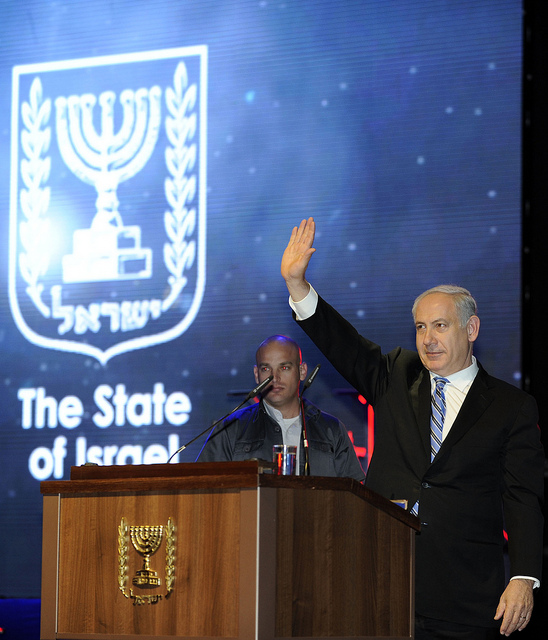
With April fast approaching, Israeli Prime Minister Benjamin Netanyahu made an official visit to Washington this week in a public push for Israeli demands regarding the ongoing Israeli-Palestinian peace negotiations.
On Monday, Netanyahu met with United States President Barak Obama in the Oval Office in what a senior official in the Obama Administration called not as contentious as past encounters between the two leaders. Obama told Netanyahu during the meeting that he would “push Palestinians” to match any Israeli concessions made in the peace talks AFP reported on Tuesday, quoting the senior official.
Haaretz reported that according to the official, Obama’s message to Netanyahu was similar to what he said in front of cameras before the meeting; “The president told Netanyahu the framework agreement would benefit Israel since it would let the negotiations continue and because Israel could influence the details of the agreement. The president also told Netanyahu that now is the time to make decisions.”
Netanyahu then delivered a speech at AIPAC’s annual policy conference on Tuesday, in which he told the audience that he wants a peace accord with the Palestinians, who in turn must recognize Israel as a Jewish state. “President Abbas: recognize the Jewish state,” he said. “You would be telling the Palestinians to abandon the fantasy of flooding Israel with refugees. In recognizing the Jewish state, you would make clear that you are truly prepared to end the conflict.”
Israelis perceived Netanyahu’s speech as a momentous shift in language and regarded it as a warning to members of the Israeli right wing. Danny Dayan, a diplomatic envoy of the Council of Jewish Committees of Judea and Samaria told reporter Barak Ravid that this was evidence of Netanyahu’s conceptual shift. Ravid believes that his speech won over the American audience, but not the majority of Israelis listening to it. “Netanyahu’s polished and eloquent speech to the AIPAC conference proved once again that he is most in his element when speaking in English to an American audience. The enthusiastic response of the thousands-strong audience reminds us that Netanyahu is far more popular as prime minister of the Diaspora than as prime minister of Israel.”
The Palestinians reacted with anger to Netanyahu’s AIPAC speech. Fatah Central Committee member Nabil Shaath told AFP that his speech amounted to “an official announcement of a unilateral end to negotiations” and that Netanyahu’s demand for recognizing Israel as a Jewish state and his rejection of Palestinian demands of refugees and international peacekeepers were “totally rejected.”
Palestinian official Hanan Ashrawi informed the Associated Press that Netanyahu went to Washington “ready to allocate blame without, in any way, showing any sign of willingness to do the right thing – to stop settlement activities, accept ’67 borders, accept signed agreements, end illegal actions and move ahead. Instead, he is reiterating his ideological condition of recognition of a Jewish state.”
On March 17, Obama will meet with Palestinian Authority President Mahmoud Abbas to urge him to sign on to the framework peace agreement.